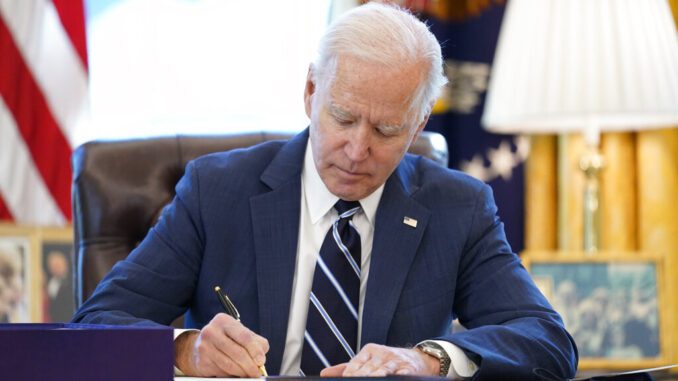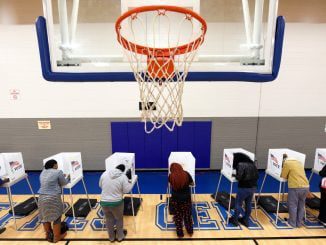
WASHINGTON, D.C. — Marking a year of loss and disruption, President Joe Biden on Thursday signed into law the $1.9 trillion relief package that he said will help the U.S. defeat the coronavirus and nurse the economy back to health. Some checks to Americans could begin arriving this weekend.
The signing came hours before Biden delivers his first prime-time address since taking office. He’s aiming to steer the nation toward a hungered-for sentiment — hope — as he marks one year since the onset of the pandemic.
“This historic legislation is about rebuilding the backbone of this country,” Biden said as he signed the bill in the Oval Office.
Most noticeable to many Americans are provisions providing up to $1,400 in direct payments, some of which could begin landing in bank accounts this weekend, and extending $300 weekly emergency unemployment benefits into early September. Also included are expanded tax credits over the next year for children, child care and family leave — some of them credits that Democrats have signaled they’d like to make permanent — plus spending for renters, feeding programs and utility bills.
The House gave final congressional approval to the sweeping package by a near party line 220-211 vote on Wednesday, seven weeks after Biden entered the White House and four days after the Senate passed the bill. Republicans in both chambers opposed the legislation unanimously, characterizing it as bloated, crammed with liberal policies and heedless of signs the crises are easing.
Biden originally planned to sign the bill on Friday, but it arrived at the White House more quickly than anticipated.
“We want to move as fast as possible,” tweeted White House chief of staff Ron Klain. He added, “We will hold our celebration of the signing on Friday, as planned, with congressional leaders!”
Previewing his Thursday night remarks, Biden said he would “talk about what we’ve been through as a nation this past year, but more importantly, I’m going to talk about what comes next.”
Biden’s challenge will be to honor the sacrifices made by Americans over the past year while encouraging them to remain vigilant despite “virus fatigue” and growing impatience to resume normal activities given the tantalizing promise of vaccines. Speaking on the one-year anniversary of the World Health Organization’s declaration of a pandemic, he’ll mourn the dead, but also project optimism about the future.
Biden’s evening remarks in the East Room are central to a pivotal week for the president as he addresses the defining challenge of his term: shepherding the nation through the twin public health and economic storms brought about by the virus.
On Monday, the Centers for Disease Control and Prevention released initial guidance for how vaccinated people can resume some normal activities. On Wednesday, Congress approved the president’s $1.9 trillion “American Rescue Plan,” aimed at easing the economic impact of the virus on tens of millions of people. And the nation was on pace to administer its 100 millionth dose of vaccine as soon as Thursday.
Biden said he would focus his remarks on what his administration plans to deliver in the coming months, but also reiterate his call for Americans to continue to practice social distancing and wear face coverings to hasten the end of the pandemic.
“I’m going to launch the next phase of the COVID response and explain what we will do as a government and what we will ask of the American people,” he said.
He added: “There is light at the end of this dark tunnel of the past year. There is real reason for hope.”
Almost exactly one year ago, President Donald Trump addressed the nation to mark the WHO’s declaration of a global pandemic. He announced travel restrictions and called for Americans to practice good hygiene.
For Biden, who has promised to level with the American public after the alternate reality of Trump’s virus talk, the imperative is to strike the correct balance “between optimism and grief,” said Princeton history professor and presidential scholar Julian Zelizer.
“Generally, the country likes optimism, and at this particular moment they’re desperate for optimism, but you can’t risk a ‘Mission Accomplished’ moment,'” he said, warning against any premature declaration that the threat has been vanquished.
Fifty days into his presidency, Biden is experiencing a polling honeymoon that his predecessor never enjoyed. Yet public sentiment remains stubbornly polarized and fewer people among his critics seem willing to say they’ll give him a chance than was the case for earlier presidents. Overall, he has earned strong marks on his handling of the pandemic.
The White House hopes that as Biden assumes the role of cheerleader for the virus relief package, the elements of the $1.9 trillion bill that are popular with Republicans will boost his support even further.
Presidential addresses to Congress “tend to be a series of soundbites,” Brinkley said. “This way, he can make his case directly.”
Still, the prime-time speech is in many ways an anachronism, better suited for an era when Americans had vastly fewer television options and in which a presidential address could reframe the national conversation.
The fragmented media landscape makes it more difficult for Biden to reach people, Zelizer said, but that may be beside the point.
“Everything he’s doing is throwback,” said Zelizer. “It’s part of his effort to create normalcy after the last four years.”



